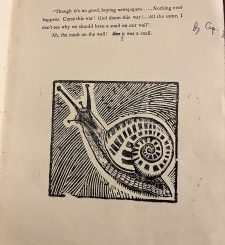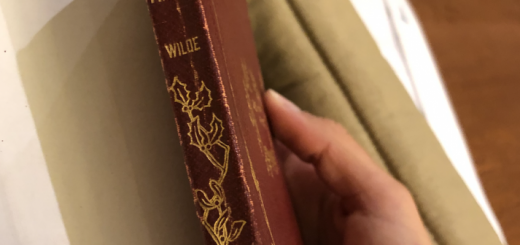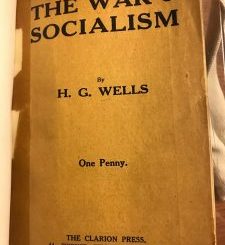Camus’ short story “The Adulterous Woman” follows French housewife Janine as she is strung along by her husband through French Algeria and as she contemplates the solitude of her married life, a story of finding purpose that parallels Camus’ own journey as a writer, as he himself grappled with the duty of a writer to “truth” and to “freedom”, ultimately leading to a conviction that art is not a solitary life. In his acceptance of the Nobel Prize, Camus speaks very openly about the writer’s duty to resist oppression and be on the side of those without voices, a theme that changes how I viewed both Camus’ reputation as an absurdist and his short story “The Adulterous Woman”.
The speech, given in 1957 in French and translated the following year in English, is transcribed by Alfred A. Knopf into a 9-page pamphlet, printed on cardstock-like paper with a striped cover. The form in which the speech is transcribed lends Camus’ words a credibility that is usually reserved for written stories only; a speech is typically listened to rather than read, and so the small details of it may be lost as the listener does not have the chance to go over a passage again as a reader does. The impressively made cover and design all serve to establish the words of the speech itself as an important piece of literature, even if normally a speech would not fit that definition.

In his speech, Camus spoke at length about what he believed to be the “duty of an author”, as well as his disillusionment with other European writers who had been “reduced to silence”. Though he does not mention it by name, in 1957 the Algerian War for Independence was going on into its third year, notable because Camus himself was both criticized for being too vocal or not vocal enough about the war and also because the setting of “The Adulterous Woman” is French Algeria. As a writer who was at the forefront of the literary world (as evidenced by his winning the Nobel Prize), the pressure to “remain connected with the world” and use his power to advocate a specific position was undoubtedly great, something Camus appears to have welcomed, though he is also effusively humble in the beginning parts of the speech.

Interestingly, though Camus here appears to believe in the idea of purpose, his most famous works and ideas are more in line with the existentialist school of thought, specifically absurdism, which Camus is often credited with being a foremost creator of. Absurdism, the idea that humans not only have no created purpose but should not seek to make one of their own, and instead embrace the meaningless of existence, appears far from Camus’ idea in 1967 that writers have a duty to not be silent.
It does, however, align very closely with the themes from “The Adulterous Woman”. Janine at the beginning of the story is “silent”, isolated from those around her, including her husband. She attempts to convince herself through the entirety of the story that she loves Marcel and he loves her, but only after they make love and Janine contemplates her feelings does she realize “she was overcoming nothing, she was not happy, she was going to die, in truth, without being liberated”. She runs away from the house and looks into the night sky, overwhelmed by the stars, and connects with them much more deeply than she does with her husband. While we are led to believe that Janine’s adultery (as suggested by the title) may come in the form of wants and thoughts while she interacts with the French soldier and the proud Arab man, her true adultery is to feel connected and part of a larger universe, which is notably more erotic than anything involving her husband: “A final burst of energy hurled her despite herself onto the terrace, against the parapet, which was now pressing her belly. She was panting and everything was hazy before her eyes.”

Janine is an example of the “unknown prisoner”, who otherwise would be exiled from the world and whose story does not exist until the writer has the privilege to make it art. While referring to Janine, Camus may at the same time be writing about the power dynamics between husbands and wives, as Marcel appears to drag Janine around with him against her wishes, and Janine appears at times helpless to do anything else, and this is precisely what Camus speaks about when he suggests that the writer has a duty owed to those who would otherwise be bulldozed by the momentum of history. Janine also serves as a standin for the creative drive, a compulsion to connect, rather than to be isolated, as Camus suggests in his speech. It is more than just a duty, it is a “calling” as if the will of a writer is not necessarily innate but given to one for a specific purpose.
Overall, Camus’ speech upon his acceptance of the Nobel Prize provides insight into Camus’ own belief about his purpose as a writer to serve society and the world at large, which can be tied to what he did and did not say about the French-Algerian war, as well as to the story “The Adulterous Woman”, similarly about finding purpose in isolation.









Recent Comments